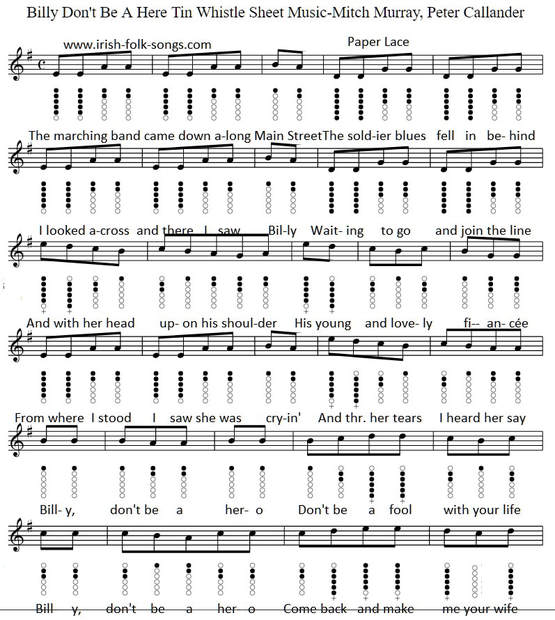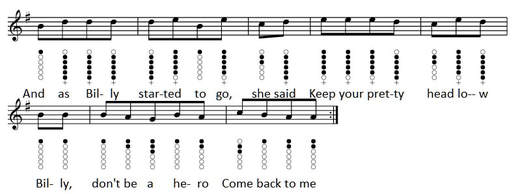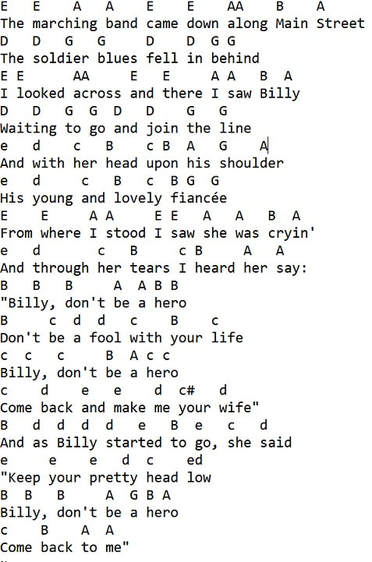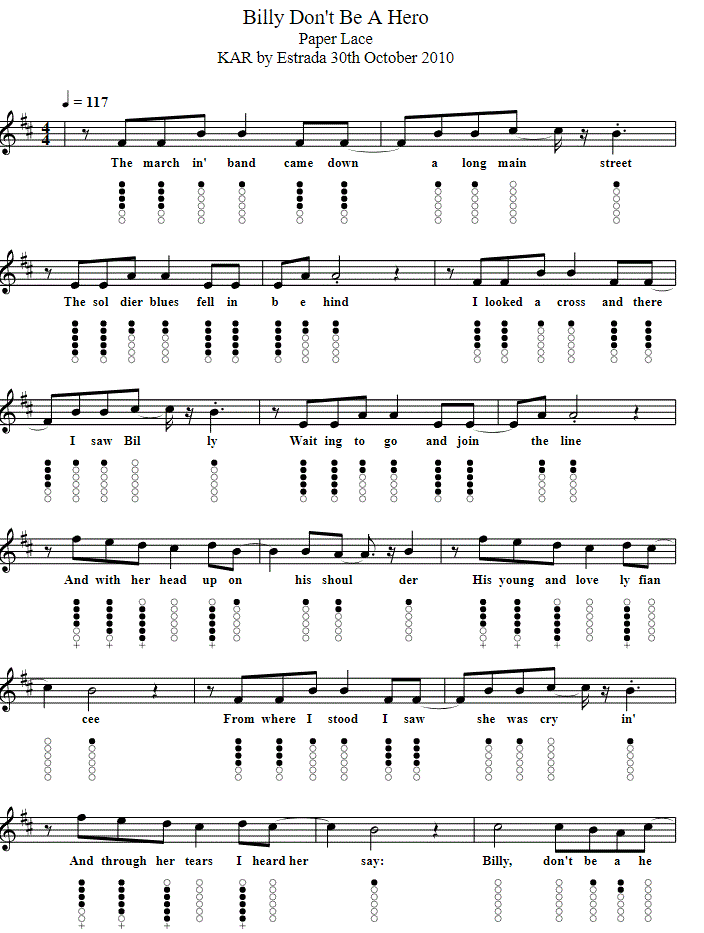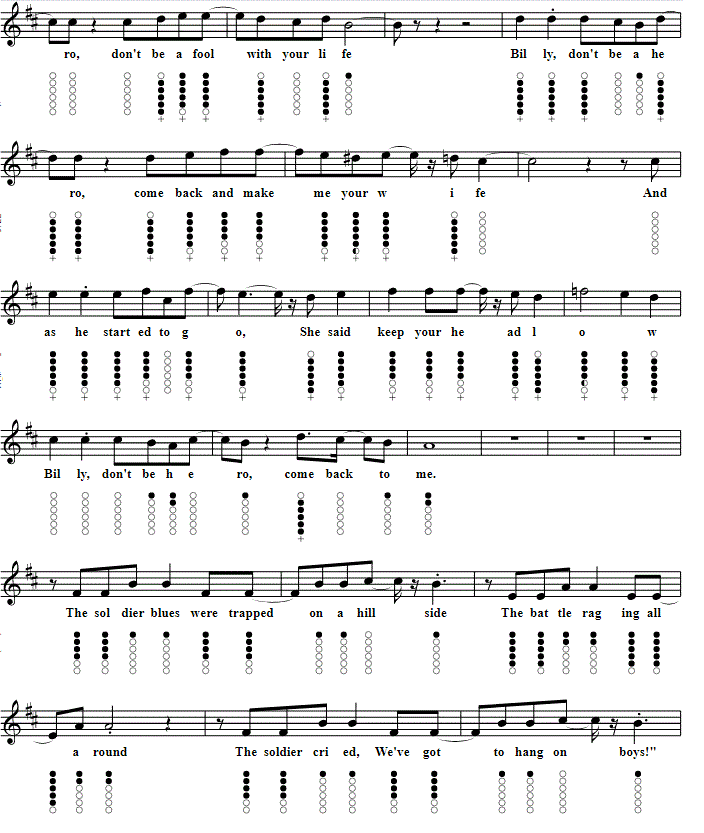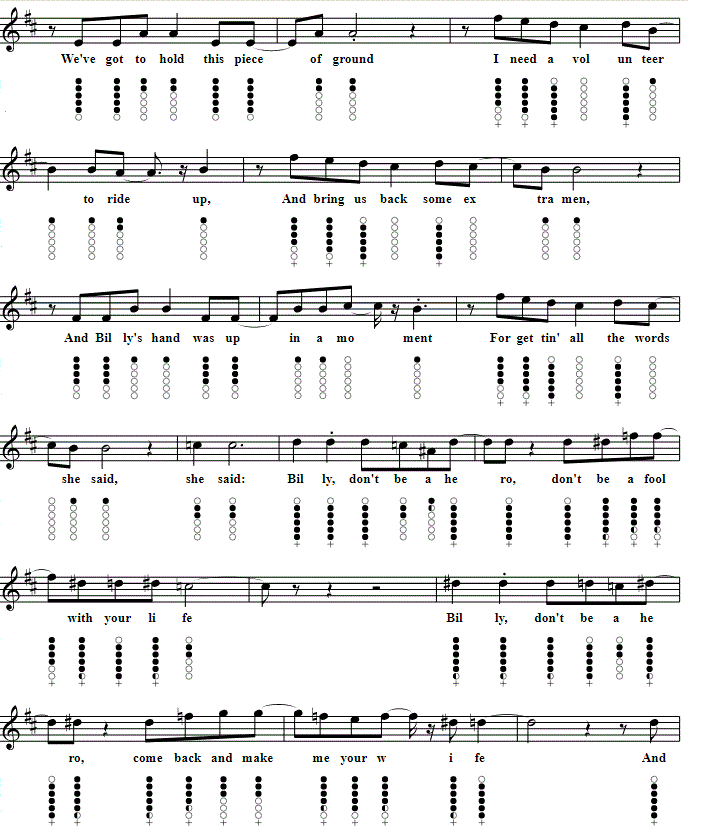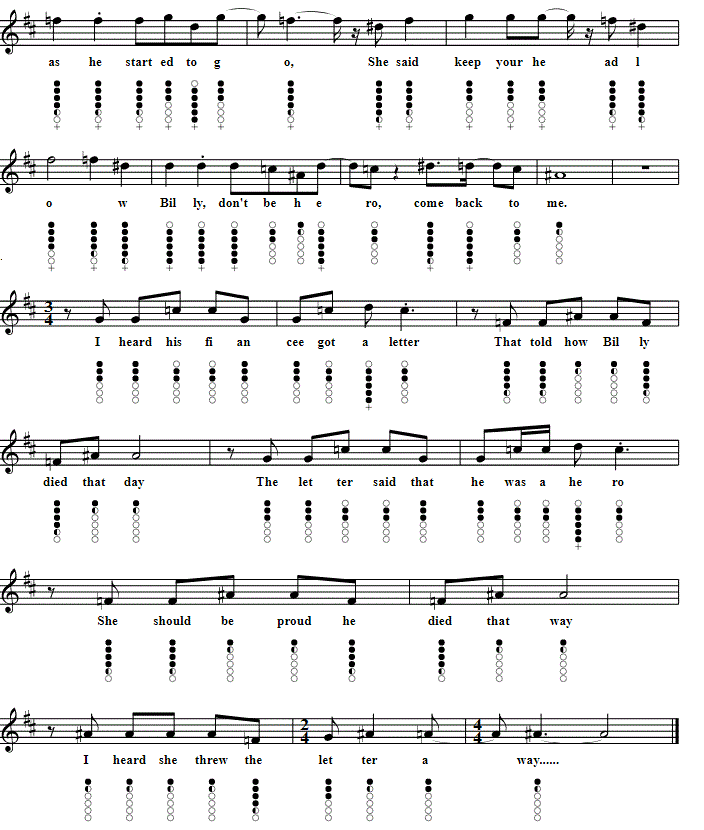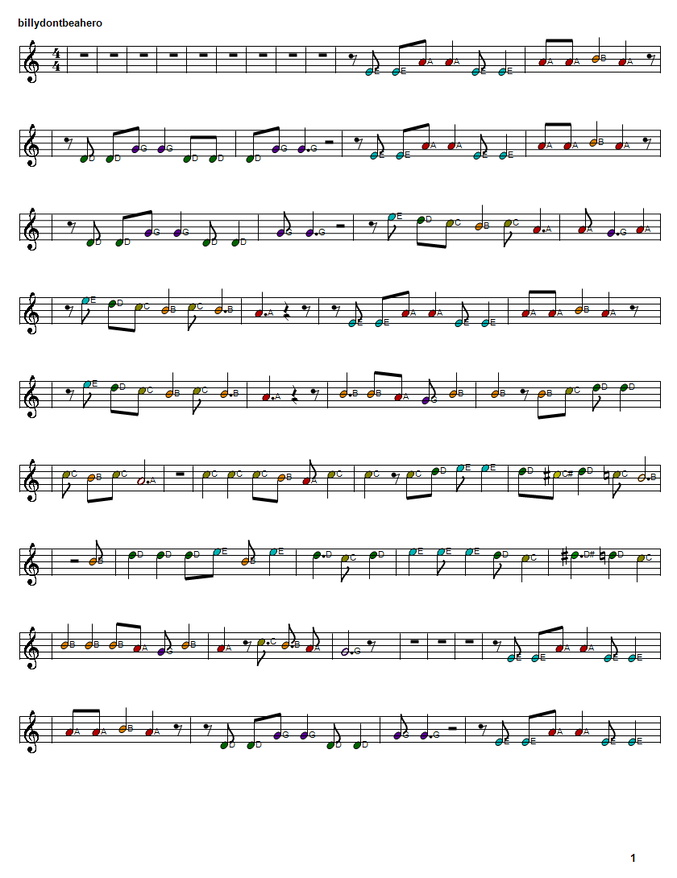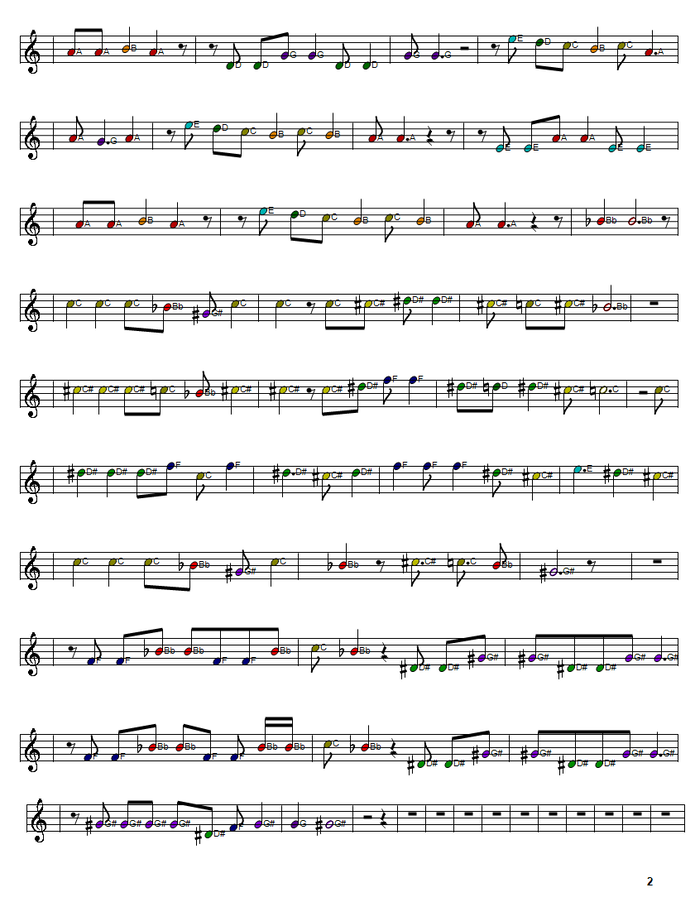Billy Don't Be A Hero Tin Whistle Sheet Music
Billy Don't Be A Hero was recorded in the 1970's by British band Paper Lace and in America by Bo Donaldson and The Heywoods. The sheet music is in the key of G and the basic letter notes are included. Although it's in the key of G there is one c not that is sharp where it says ''Your'' wife,[ watch out for it.] Also included is the full standard sheet music score with lyrics.
Introduction:
The song 'Billy Don't Be a Hero' has been a popular hit since its release in 1974, with its catchy tune and powerful message. Written by Mitch Murray and Peter Callander, it tells the story of a young man named Billy who joins the army to fight in a war, despite his fiancée's pleas for him to stay home. The song's popularity reflects its relevance and impact on society, as it addresses themes of war, sacrifice, and the consequences of blind patriotism. This thesis will delve deeper into the significance and meaning of 'Billy Don't Be a Hero' and its impact on society.
Analysis of Lyrics:
The lyrics of 'Billy Don't Be a Hero' are simple and yet poignant, effectively conveying its message to listeners. The song begins with the lines 'The marchin' band came down along Main Street/The soldier-blues fell in behind.' These opening lines immediately set the scene of a small town and its inhabitants being swept up in the fervor of war. The use of 'soldier-blues' creates a sense of uniformity and reinforces the idea of conformity and blind patriotism.
The chorus of the song is the most powerful and memorable aspect, with the repeated refrain of 'Billy, don't be a hero/Don't be a fool with your life.' This line serves as a warning to the protagonist, Billy, and to the listeners, not to blindly follow the call to war and to consider the consequences of such actions. It also highlights the theme of sacrifice and the question of whether it is worth it to risk one's life for a cause.
The second verse of the song introduces the character of Billy's fiancée, who begs him not to go to war. She sings, 'I heard his fiancée got a letter/That told how Billy died that day.' This verse adds a personal touch to the song, as it humanizes the consequences of war. It also raises the question of whether the glorification of war and heroism is worth the loss of loved ones.
The final verse of the song reveals that Billy's fiancée did not receive a letter from him, indicating that he survived the war. However, the line 'And Billy, Billy, don't look like he's comin' home' implies that he has been forever changed by his experiences in war. This last verse serves as a cautionary tale, warning against the physical and psychological toll that war takes on individuals.
Themes:
The song 'Billy Don't Be a Hero' addresses several themes that are still relevant today. The most prominent theme is that of war and its consequences. The song presents a critical view of war, portraying it as a destructive force that leaves behind a trail of loss and suffering. It challenges the notion of war as a heroic and noble endeavor and instead highlights the human cost of war.
The theme of sacrifice is also central to the song, as it raises the question of whether it is worth risking one's life for a cause. The lyrics 'He said, 'I gotta do what I gotta do, I can't let you go'' reflect the pressure and duty that soldiers feel to fulfill their duty, even if it means sacrificing their own lives.
Another theme that is addressed in the song is the dangers of blind patriotism and conformity. The use of 'soldier-blues' and 'marchin' band' in the opening lines suggests the pressure to conform and blindly follow the call to war. The song challenges individuals to think critically and not blindly follow authority.
Impact on Society:
'Billy Don't Be a Hero' was released during the Vietnam War, a time of great social and political upheaval. The song's message resonated with many who were questioning the justification and consequences of the war. It became an anthem for the anti-war movement, with its powerful lyrics and catchy tune capturing the attention of the public.
The song also sparked a debate about the glorification of war and its impact on individuals. It forced people to confront the harsh realities of war and to question whether it was worth the loss of life and devastation. 'Billy Don't Be a Hero' helped to shift public perception and bring attention to the human toll of war.
Conclusion:
In conclusion, 'Billy Don't Be a Hero' is more than just a catchy tune, but a powerful and thought-provoking song that addresses important themes and issues. Its relevance and impact on society are still felt today, as it continues to be played and referenced in popular culture. The song serves as a reminder to question authority, think critically, and consider the consequences of our actions. It is a timeless message that will continue to resonate with listeners for years to come.
The song 'Billy Don't Be a Hero' has been a popular hit since its release in 1974, with its catchy tune and powerful message. Written by Mitch Murray and Peter Callander, it tells the story of a young man named Billy who joins the army to fight in a war, despite his fiancée's pleas for him to stay home. The song's popularity reflects its relevance and impact on society, as it addresses themes of war, sacrifice, and the consequences of blind patriotism. This thesis will delve deeper into the significance and meaning of 'Billy Don't Be a Hero' and its impact on society.
Analysis of Lyrics:
The lyrics of 'Billy Don't Be a Hero' are simple and yet poignant, effectively conveying its message to listeners. The song begins with the lines 'The marchin' band came down along Main Street/The soldier-blues fell in behind.' These opening lines immediately set the scene of a small town and its inhabitants being swept up in the fervor of war. The use of 'soldier-blues' creates a sense of uniformity and reinforces the idea of conformity and blind patriotism.
The chorus of the song is the most powerful and memorable aspect, with the repeated refrain of 'Billy, don't be a hero/Don't be a fool with your life.' This line serves as a warning to the protagonist, Billy, and to the listeners, not to blindly follow the call to war and to consider the consequences of such actions. It also highlights the theme of sacrifice and the question of whether it is worth it to risk one's life for a cause.
The second verse of the song introduces the character of Billy's fiancée, who begs him not to go to war. She sings, 'I heard his fiancée got a letter/That told how Billy died that day.' This verse adds a personal touch to the song, as it humanizes the consequences of war. It also raises the question of whether the glorification of war and heroism is worth the loss of loved ones.
The final verse of the song reveals that Billy's fiancée did not receive a letter from him, indicating that he survived the war. However, the line 'And Billy, Billy, don't look like he's comin' home' implies that he has been forever changed by his experiences in war. This last verse serves as a cautionary tale, warning against the physical and psychological toll that war takes on individuals.
Themes:
The song 'Billy Don't Be a Hero' addresses several themes that are still relevant today. The most prominent theme is that of war and its consequences. The song presents a critical view of war, portraying it as a destructive force that leaves behind a trail of loss and suffering. It challenges the notion of war as a heroic and noble endeavor and instead highlights the human cost of war.
The theme of sacrifice is also central to the song, as it raises the question of whether it is worth risking one's life for a cause. The lyrics 'He said, 'I gotta do what I gotta do, I can't let you go'' reflect the pressure and duty that soldiers feel to fulfill their duty, even if it means sacrificing their own lives.
Another theme that is addressed in the song is the dangers of blind patriotism and conformity. The use of 'soldier-blues' and 'marchin' band' in the opening lines suggests the pressure to conform and blindly follow the call to war. The song challenges individuals to think critically and not blindly follow authority.
Impact on Society:
'Billy Don't Be a Hero' was released during the Vietnam War, a time of great social and political upheaval. The song's message resonated with many who were questioning the justification and consequences of the war. It became an anthem for the anti-war movement, with its powerful lyrics and catchy tune capturing the attention of the public.
The song also sparked a debate about the glorification of war and its impact on individuals. It forced people to confront the harsh realities of war and to question whether it was worth the loss of life and devastation. 'Billy Don't Be a Hero' helped to shift public perception and bring attention to the human toll of war.
Conclusion:
In conclusion, 'Billy Don't Be a Hero' is more than just a catchy tune, but a powerful and thought-provoking song that addresses important themes and issues. Its relevance and impact on society are still felt today, as it continues to be played and referenced in popular culture. The song serves as a reminder to question authority, think critically, and consider the consequences of our actions. It is a timeless message that will continue to resonate with listeners for years to come.
Below is the standard sheet music score for Billy Don't Be A Hero.
